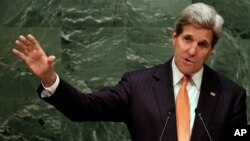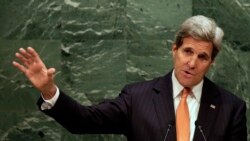Addressing the Nuclear Nonproliferation Treaty Review conference in New York, Secretary of State John Kerry posed a question. “Can we really create a future in which nuclear weapons exist only within the pages of history books? The answer is yes.”
But only, said Mr. Kerry, if the world embraces a notion of change in the conduct of global affairs and the resolution of conflicts. And one milestone on that journey began 45 years ago when the Nuclear Nonproliferation Treaty, or NPT, entered into force.
The core of the NPT is straightforward: countries without nuclear weapons will not obtain them; countries with nuclear weapons will move towards disarmament; and all countries will have access to peaceful nuclear energy.
But for the treaty to remain relevant it is critical that its words have weight, Mr. Kerry said. “And that means the world has to remain united in rejecting the proliferation of nuclear weapons anywhere.”
Today there is the potential for historic progress toward that goal, he said, citing the ongoing negotiations between Iran and the P5+1 countries who are working toward a comprehensive nuclear accord to “close off all of Iran’s possible pathways to the nuclear material required for a nuclear weapon, and give the international community the confidence…to know that Iran’s nuclear program is…exclusively peaceful.”
Secretary Kerry cited North Korea as “the most glaring example” of a country ignoring its global obligations and threatening international security and peace. North Korea, he said, must abandon its nuclear weapons and programs and come into full compliance with the duties it accepted when it first became part of the NPT.
Secretary of State Kerry said the United States is mindful that in return for a commitment to refrain from pursuing nuclear weapons, the existing nuclear powers are to steadily disarm, fulfilling their part of the bargain. The United States, he stressed, is doing just that: drastically reducing its stockpile of nuclear weapons by almost 85 percent since it signed the NPT; dismantling over 10,000 nuclear warheads since 1994-an average of more than one warhead dismantled every day-and seeking to further accelerate the dismantlement of retired nuclear warheads by another 20 percent.
In addition, the United States is proud to play a strong role in relation to the third pillar of the NPT: expanding the peaceful uses of the atom.
“We are committed,” Secretary of State Kerry said, “to carry on the treaty’s essential work, and most of all, to leave the race for nuclear arms in the past.”






